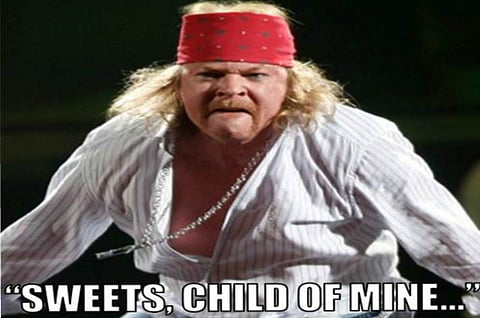Appetite for destruction: Axl Rose demands Google remove ‘fat’ photos
The Guns N’ Roses frontman is trying to get Google to remove images that he says violate copyright — and they just happen to be a little unflattering

Guns N’ Roses frontman Axl Rose has long battled the trappings of internet-era celebrity. When his band was inducted into the Rock and Roll Hall of Fame in 2012, the singer wrote a 1,000-word open letter refusing his own part in the induction and imploring the organisation not to include him in absentia. The hall of fame politely yet swiftly declined his request.
Undeterred, Rose is now taking on the definitive hall of fame — waging war against Skynet itself, no less — by demanding that Google removes the now infamous photos of his sweaty, rounder-than-usual face from a 2010 concert now associated with the “fat Axl Rose” meme from their search engines. Rose might feel the meme is detracting attention from Guns’n’Roses’ forthcoming tour, what with the memes about “sweet pie’o’mine”, or “take me down to bakery city’. But then again, most people probably wouldn’t have heard of it if he hadn’t started issuing DMCA — or Digital Millennium Copyright Act — takedown requests.
His argument — bolstered by web privacy firm Web Sheriff, a company with inexplicable taste in clip art that advocates B2B “persuasion” over litigation in piracy cases — is that the images, taken by Canadian photographer Boris Minkevich and originally published in the Winnipeg Free Press, are actually Rose’s own property. Rose claims all photographers were required to sign a release form upon entering the concert; this may be the general rule at Guns N’ Roses shows, but Minkevich has said he doesn’t recall whether he did or did not sign one.
Google declined to comment on the case. The DMCA is the act that officially codified and criminalised internet piracy in America in 1998. Though well-intentioned, it has subsequently become the worst nightmare of everyone except major music labels and other corporate entities trafficking largely in intellectual property.
Legal teams who send out DMCA notices (the ones powerful enough to get taken seriously, anyway) usually don’t care to determine whether the use of their clients’ copyrighted property is protected by fair use. That means anyone using parts of a copyrighted work for satirical, parodic, educational, research-based or critical purposes — all of which are legal — can be shut down without warning, and it takes a Herculean amount of effort, time, and legal fees to subvert, which is almost always not worth the fight for the fair user. As advocacy non-profit Electronic Frontier Foundation succinctly put it in 2010: “By banning all acts of circumvention, and all technologies and tools that can be used for circumvention, the DMCA grants to copyright owners the power to unilaterally eliminate the public’s fair use rights.”
Rose has not stated a motive for insisting these unflattering photos are removed aside from copyright, but it’s probably safe to assume it’s for the same reason Beyonce’s publicist requested something similar of BuzzFeed in 2013. Bey, we assume, did not want you to see her being quite that fierce, or grimace.
On the one hand, being able to remove photos of yourself disseminated without your permission should in theory be fairly easy. On the other hand, in reality, for everyday citizens and under far worse circumstances, without the heft of a DMCA notice to bolster your request — and a legal team to protect your pristine public image — it is decidedly not.
If only Rose could pause for a moment to think a bit beyond than his own personal plight, perhaps he would think to lend his celebrity clout to the fight for legislation against online harassment. Until then, it might be preferable to shift attention to this far superior Axl Rose meme until an understanding between the two parties is reached.



